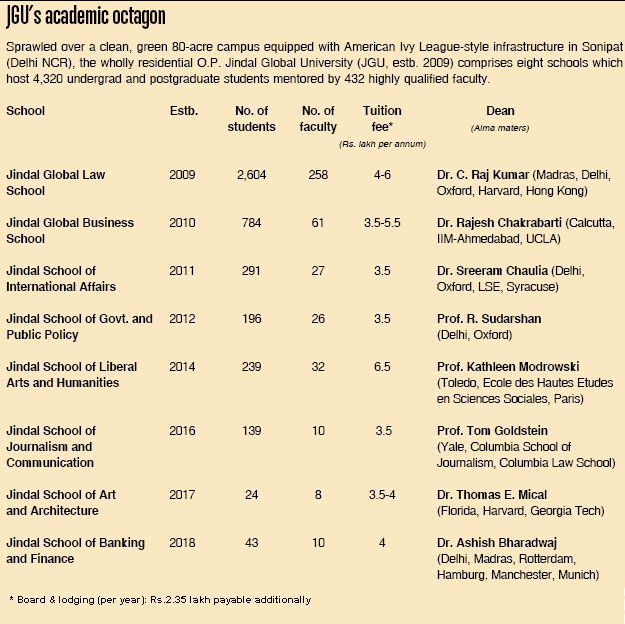Since it admitted its first batch of 100 students a decade ago, the O.P. Jindal Global University, Sonipat (Haryana) has established itself as one of India’s most promising humanities and liberal arts universities. In the QS BRICS University Rankings 2019, JGU is ranked among the Top 3 percent and among the Top 450 in the QS Asia league table – Dilip Thakore
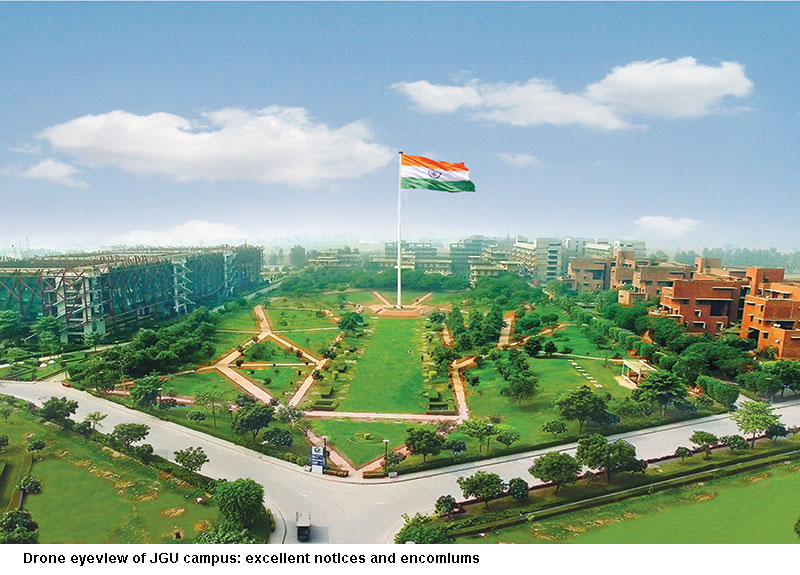
There’s a palpable sentiment of euphoria and great expectations on the 80-acre campus of the O.P. Jindal Global University, Sonipat (Haryana) in Delhi NCR (JGU, estb. 2009). Since it admitted its first batch of 100 students into its law school a decade ago, JGU has quickly established itself as one of India’s most promising, high-potential law, humanities and liberal arts universities. Within the short span of a decade, the number of schools under the umbrella of this American Ivy League-style wholly residential privately promoted university has increased to eight, which together host 4,300 students mentored by 432 faculty.
The pervasive euphoria on the sprawling JGU campus dominated by its four-storeyed academic block with a built-up area of 300,000 sq. ft. designed by celebrated French architect Stephane Paumier and distinguished by massive criss-crossed steel cantilevers — a tribute to philanthropist-industrialist Naveen Jindal, chairman of the Delhi-based Jindal Steel & Power Ltd (estb. 1952), the country’s third largest steel manufacturing company (annual revenue: Rs.28,444 crore) and JGU’s founder-chancellor — is the outcome of the excellent notices and encomiums this fledgling university has received in its tenth anniversary year. In the latest 2019 World University Rankings (WUR) league tables of the authoritative London-based Quacquarelli Symonds (QS), JGU is ranked among the Top 3 percent of 9,000 BRICS (Brazil, Russia, India, China and South Africa) higher education institutions and the youngest Indian university in the Top 300. In the QS Asia league table of 13,000 universities assessed, JGU is ranked among the Top 450.
Back home, although the newly-promoted JGU does not figure in the National Institutional Ranking Framework (NIRF) 2018 league table of India’s Top 100 universities dominated by science and technology universities, it was awarded the swachhata (‘cleanliness’) award of the Union ministry of human resource development for maintaining the country’s cleanest-greenest campus in 2017 and ranked #2 this year. Moreover in the EducationWorld India Higher Education Rankings 2018-19, JGU is ranked #22 among the country’s Top 100 private universities, and #8 under the parameter of internationalism (EW May 2018). More significantly in a survey conducted by the Economic Times — India’s #1 business daily — JGU was adjudged India’s most international university on the basis of the largest number of foreign faculty employed (ET November 4, 2018).
Indeed the cup of this new greenfield preteens university is brimmeth over. On December 7, the Union HRD ministry shortlisted JGU for inclusion in its second list of ten Institutions of Eminence which will be awarded full academic autonomy, i.e, freeing it from following the standardised lowest common denominator syllabuses prescribed by the University Grants Commission or its proposed successor, the Higher Education Commission of India.
“JGU is a promising new liberal arts university with the potential to develop into the Harvard of India, if it sustains its internationally competitive culture and fast-paced decision making and implementation momentum. The factors in its favour are its transparency, and the speed with which it has been able to recruit internationally respected scholars to serve as faculty. Indeed it’s the fastest rising liberal arts higher education institution in India and a good role model for other universities to follow,” says Ashwin Fernandes, a commerce and business management postgraduate of Goa University and currently the Singapore/Bangalore-based regional director (Middle East, North Africa and South Asia) of the QS Intelligence Unit, an autonomous division of Quacquarelli Symonds and CEO of QS I Gauge, the recently launched India venture of this pioneer London-based publisher of the annual WUR league tables.
The hail of encomiums raining down on this newly established liberal arts and humanities university and the bright future predicted for it, is unanimously attributed to its top leadership comprising Naveen Jindal, the wealthy Delhi-based industrialist-philanthropist who has endowed a corpus amount of Rs.500 crore upon this university which — like its neighbouring crowd-funded Ashoka University (estb. 2014), (about whom there is frosty silence on the JGU campus) — has chosen the minimally trodden path of liberal arts and humanities higher education, and its erudite, indefatigable vice chancellor Dr. C. Raj Kumar. A commerce and law graduate of Madras and Delhi universities who pressed on to earn Masters degrees and a doctorate from the globally reputed Oxford, Harvard and Hong Kong universities, Raj Kumar was appointed the founding vice chancellor of JGU in 2009 — the youngest (then 34) VC of any university countrywide.
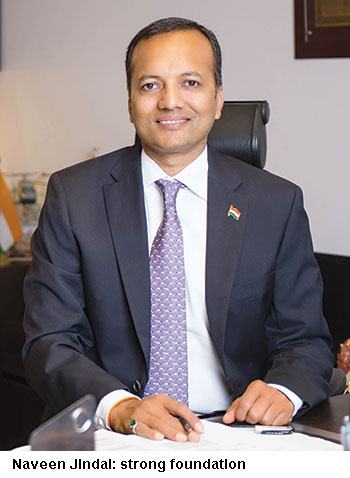 Working in tandem with exemplary speed and efficiency, this duo completed construction and operationalised the 100,000 sq.ft premises of the Jindal Global Law School (JGLS) in Sonipat, a dry and dusty outback of rural Haryana steeped in deep-rooted 18th century caste traditions, antagonisms and politics, in record time. Since then, eight interdisciplinary schools with an aggregate enrolment of 4,320 undergraduate and postgrad students, have been established on the clean-green JGU campus, an extraordinary achievement within an economy where — despite loud claims of progress by the BJP/NDA government at the Centre — the ease of doing business, and particularly starting greenfield enterprises is a tedious, time -consuming process.
Working in tandem with exemplary speed and efficiency, this duo completed construction and operationalised the 100,000 sq.ft premises of the Jindal Global Law School (JGLS) in Sonipat, a dry and dusty outback of rural Haryana steeped in deep-rooted 18th century caste traditions, antagonisms and politics, in record time. Since then, eight interdisciplinary schools with an aggregate enrolment of 4,320 undergraduate and postgrad students, have been established on the clean-green JGU campus, an extraordinary achievement within an economy where — despite loud claims of progress by the BJP/NDA government at the Centre — the ease of doing business, and particularly starting greenfield enterprises is a tedious, time -consuming process.
Quite clearly, the huge reputation of Jindal, a two-term (2004-14) Congress party MP representing the Kurukshetra (Haryana) constituency in the Lok Sabha during the rule of the Congress-led UPA I and II government, helped O.P. Jindal Global University (named after his father, the promoter-chairman of the O.P. Jindal Group of steel and power generation companies who was tragically killed in a plane crash in 2005) to get the pioneer Jindal Global Law School (JGLS), which has since flowered into JGU, up and running in quick time. In June this year, JGLS, which hosts 2,604 undergraduate and postgrad students mentored by 237 highly-qualified faculty, received 6,942 admission applications against 800 vacancies. And JGU spokespersons say they expect a 15-20 percent increase in all the other eight schools of the university next year as the name and fame of JGU spreads in India and abroad.
“Over the past nine years since it was founded, JGU has made good progress towards achieving its goals and could well emerge as a model for higher education in India. From a single school, with 100 students, and ten full-time faculty members in 2009, it has grown into a full-fledged university with eight interdisciplinary schools, three research and capacity building institutes and over 4,300 students mentored by 400-plus faculty with globally-respected credentials. That’s more than satisfactory progress. Great institutions are often built over hundreds of years, and we have built a strong foundation for JGU that will sustain academic and institutional life for the decades to come,” says Naveen Jindal.
Jindal’s satisfaction with the rapid rise in public esteem of this barely ten-year-old university is shared by Dr. C. Raj Kumar, the prime mover behind translating Jindal’s vision into the bricks and mortar JGU, whose globally comparable infrastructure includes 64 fully-wired classrooms, 56 research centres, two libraries (spread over three floors) equipped with 100,000 volumes, over 12,000 journal subscriptions (excluding EducationWorld) and 165,000 e-resources, nine halls of residence and three faculty residential units, which house, feed and educate almost 4,700 students and faculty. Sports facilities include an Olympics size swimming pool, a thoroughly contemporary gymnasium and a massive 12-acre sports ground with fields for football, hockey, cricket, basketball and volleyball, and floodlit synthetic surface tennis courts.
A commerce graduate of Madras University who proceeded to read law at Delhi University, Raj Kumar, the son of a professor at Madras University and former vice chancellor and mother in government service who rose to the position of chief medical officer of the Tamil Nadu government, “couldn’t even dream of study abroad”. But in 1997, he won one of the six Rhodes scholarships to study at Oxford University, UK, offered to students from India “which paid all expenses including passage, visa, board, lodging and tuition”.
Oxford proved to be a life-changing experience for Raj Kumar. Deeply impressed by the orderly administration, research eco-system, inspiring learning environment, unique tutorial system and the high academic standards of this ancient university, he resolved to establish a great university back home in India.
After he was awarded a Masters degree in law in 1999 by Oxford, Raj Kumar was admitted into the Harvard Law School where he studied the evolution of America’s globally respected private universities established by generous public-spirited philanthropists. After being awarded an LLM by Harvard Law School, Raj Kumar worked as a research scholar and visiting fellow at the New York University School of Law, and visiting lecturer at the Meiji Gakuin University, Tokyo and Toin University of Yokohama, Japan. This was followed by a six-year stint as professor of law at City University of Hong Kong (2002-08) — “a great public university”.
While attending a legal conference in Delhi in 2006, Raj Kumar met H.R. Bharadwaj, a Congress party veteran and Union minster of law and justice in the Congress-led UPA-I government, to whom he outlined his dream to establish a great international university with a global outlook and perspective, in India. Impressed by the young law professor’s track record and deep study of higher education institutions internationally, Bharadwaj introduced him to Naveen Jindal, fresh from his triumph of having secured a verdict in 2004 from the Supreme Court which entitles every citizen to respectfully fly the India tricolour in his home, office and public spaces, an act of patriotism prohibited by the Indian Flag Code.
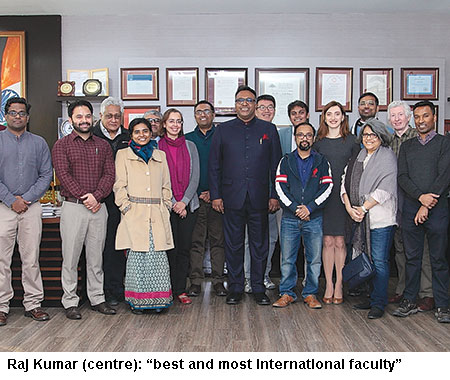 “We first met on October 30, 2006, and over the period of one year, I persuaded Mr. Jindal to become the John Harvard of India. By early 2008, Mr. Jindal agreed to endow Rs.500 crore to the proposed greenfield university named after his late father Shri O.P. Jindal, and grant this not-for-profit institution complete academic and administrative autonomy,” recalls Raj Kumar.
“We first met on October 30, 2006, and over the period of one year, I persuaded Mr. Jindal to become the John Harvard of India. By early 2008, Mr. Jindal agreed to endow Rs.500 crore to the proposed greenfield university named after his late father Shri O.P. Jindal, and grant this not-for-profit institution complete academic and administrative autonomy,” recalls Raj Kumar.
Once the project was green-signalled, the duo set about constructing and establishing JGU in right earnest. In April 2008, Raj Kumar resigned his professorship at the City University of Hong Kong and in January 2009, the Haryana state legislative assembly enacted special legislation to establish JGU as a private university of the state. And within the next six months, Jindal Global Law School, the pioneer institution of this multi-school university with a 100,000 sq. ft built-up area was completed. On September 30, 2009, the law school admitted its first batch of 100 students.
Looking back at the continuous growth and development of JGU during its first decade, Raj Kumar is pleased with the speed at which this fledgling university has established a national and international reputation. “I’m quite satisfied with the progress we have made in our long, arduous and testing first decade to establish JGU as an internationally respected liberal arts and social sciences university. A favourable combination of factors — a generous and committed philanthropist, full academic autonomy and our success in recruiting the country’s best and most international faculty has enabled us to establish partnerships including faculty and student exchanges, joint teaching and research programmes, with over 250 top-ranked academic institutions in 55 countries — is behind the rapid rise of JGU in public esteem,” says Raj Kumar.
Although the Jindal Global Law School (Raj Kumar is de facto dean), which hosts the progeny of a large number of high court judges and Supreme Court counsel, has emerged as the showpiece school of JGU rated on a par with the prestigious National Law School of India University, Bangalore (India Today ranks JGLS #2 among the country’s newly emergent law schools and Careers 360 #1), the other eight schools of this fast-track new university are also establishing formidable public reputations.
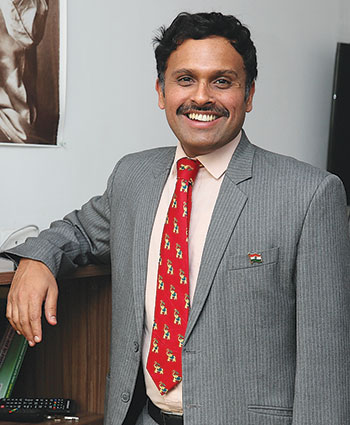 For instance, the Jindal School of International Affairs (JSIA, estb. 2009) — India’s first global policy private sector institute — offers its unique self-designed three-years bachelor’s programme in global affairs to undergraduates and Masters programmes in diplomacy, law and business. “JSIA’s objective is to generate and spread interdisciplinary social sciences knowledge that informs current and future international policymaking, through rigorous academic training of students. This dovetails with JGU’s overall institutional goal of becoming a knowledge storehouse of the social sciences, which have long played second fiddle to the hard sciences in Indian academia. Although the need for building a world-class graduate school as a gamechanger in international studies education in India has been expressed in many quarters, JGU is the first university to formally establish an inter-disciplinary school of international studies,” says Dr. Sreeram Chaulia, an alumnus of Delhi, Oxford and Syracuse universities, the London School of Economics, and founding dean of this novel school. Currently JSIA, which has established an education centre for Chinese language where students (including army and intelligence agencies’ personnel) learn Mandarin Chinese, has 291 students mentored by 27 faculty, “half of whom are non-Indian”, on its muster rolls.
For instance, the Jindal School of International Affairs (JSIA, estb. 2009) — India’s first global policy private sector institute — offers its unique self-designed three-years bachelor’s programme in global affairs to undergraduates and Masters programmes in diplomacy, law and business. “JSIA’s objective is to generate and spread interdisciplinary social sciences knowledge that informs current and future international policymaking, through rigorous academic training of students. This dovetails with JGU’s overall institutional goal of becoming a knowledge storehouse of the social sciences, which have long played second fiddle to the hard sciences in Indian academia. Although the need for building a world-class graduate school as a gamechanger in international studies education in India has been expressed in many quarters, JGU is the first university to formally establish an inter-disciplinary school of international studies,” says Dr. Sreeram Chaulia, an alumnus of Delhi, Oxford and Syracuse universities, the London School of Economics, and founding dean of this novel school. Currently JSIA, which has established an education centre for Chinese language where students (including army and intelligence agencies’ personnel) learn Mandarin Chinese, has 291 students mentored by 27 faculty, “half of whom are non-Indian”, on its muster rolls.
Quite obviously, JGU was conceptualised as a globally benchmarked liberal arts and humanities university not only to differentiate it from the thousands of low-brow multi-disciplinary Central and state government-promoted and/or aided arts, science and commerce degree factories, which are churning out an estimated 10 million mainly unemployable graduates annually, but also because the country’s top-ranked universities tend to be science and technology institutions. One of the great mistakes of post-independence India’s Soviet-inspired centrally planned higher education development model was too great an emphasis on STEM (science, technology, engineering and maths) to the neglect of the liberal arts and social sciences. Therefore, the overwhelming majority of the country’s top-ranked education institutions are science and technology institutions such as the Indian Institute of Science, the IITs and IIMs.
This neglect of the arts and social sciences has cost the nation dear in terms of an acute shortage of well-educated, high-quality social scientists and liberal arts graduates with adequate knowledge of the country’s history, culture, politics and essential character. The rise to positions of power in government and the bureaucracy of narrowly educated scientists and techies and their proclivity to apply imported technical solutions to post-independence India’s national development effort has proved a conspicuous failure and relegated the high-potential post-World War II Indian economy into a pathetic also-ran position in the global race for national prosperity.
Consequently, great care and deep research has been taken to develop the syllabus and curriculum of the Jindal School of Liberal Arts and Humanities (JSLH, estb. 2013). The high importance that the JGU leadership accords to the study of these subjects, which are usually the last option of school-leavers entering tertiary education, is encapsulated in a stirring declaration on the importance of these subjects on JSLH’s website. “A perspective in liberal arts creates the humus for judgement. While emphasizing the life of a book, the college opens out to the book of life, creating the citizen scholar as the basis of democracy. It is in this context that citizenship, civility and civitas become ideals of a democratic society. Liberal arts and humanities provide both the table manners and the customs and frames of justice of a democratic society.”
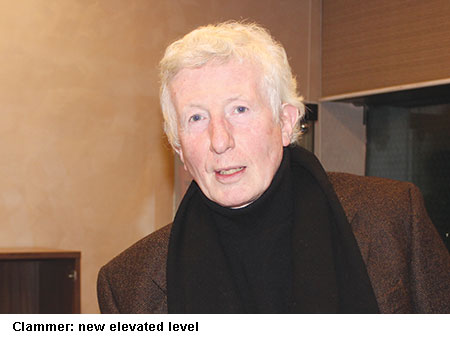 Although Prof. Kathleen Modrowski, the highly regarded dean of JSLH, was abroad when your correspondent visited the JGU campus last month, Prof. John Clammer, an alum of UK’s Lancaster and Oxford universities who teaches social studies at the school, took pains to explain the wide span of the school’s multi-disciplinary three-year liberal arts and humanities degree programme. “All JSLH students are obliged to study eight majors including history, sociology, expressive and creative arts, comparative literature, languages and writing during the first half of their three-year undergraduate programme. The curriculum requires them to study eight majors and six electives which can be from among subjects offered by other JGU schools. Moreover, they must complete two summer and two winter internships and write an honours thesis. In the final year they have the option to either specialise in one of 11 subjects or self design a study programme comprising a major and electives. In JSLH, we have raised inter-disciplinary liberal arts study to an entirely new elevated level,” says Clammer.
Although Prof. Kathleen Modrowski, the highly regarded dean of JSLH, was abroad when your correspondent visited the JGU campus last month, Prof. John Clammer, an alum of UK’s Lancaster and Oxford universities who teaches social studies at the school, took pains to explain the wide span of the school’s multi-disciplinary three-year liberal arts and humanities degree programme. “All JSLH students are obliged to study eight majors including history, sociology, expressive and creative arts, comparative literature, languages and writing during the first half of their three-year undergraduate programme. The curriculum requires them to study eight majors and six electives which can be from among subjects offered by other JGU schools. Moreover, they must complete two summer and two winter internships and write an honours thesis. In the final year they have the option to either specialise in one of 11 subjects or self design a study programme comprising a major and electives. In JSLH, we have raised inter-disciplinary liberal arts study to an entirely new elevated level,” says Clammer.
This culture of devising innovative multi-disciplinary syllabuses and curriculums with strong emphasis on experiential learning through industry internships, student and faculty exchanges with higher education institutions around the world, is a distinguishing characteristic of all eight schools under the JGU umbrella.
While profiling all the schools of this next gen liberal arts university is an inviting prospect, due to constraints of time and space, it is beyond the scope of this cover feature. Our objective is to provide students, academics and higher education policy formulators a bird’s eye view of the institutional culture and spirit of this contemporary, internationally benchmarked liberal arts university engaged in preparing its eager-to-learn students for the irrevocably crystallising global economy in which transnational knowledge and cross-cultural life skills are prerequisites of success.
And this institutional determination to differentiate itself from the herd by providing unapologetically internationally benchmarked higher education is most evident in the university’s Jindal Global Business School (JGBS, estb. 2010) which has 784 students enrolled in its three-year BBA, two-year MBA and five-year integrated BBA+MBA programmes.
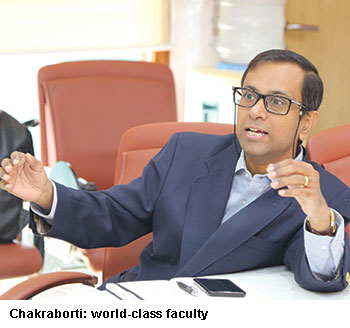 “The defining characteristic of our business management programmes is a multi-disciplinary curriculum extending beyond business and management subjects. It permits our students to take courses from the other schools of JGU. Moreover, we have been successful in recruiting world-class faculty from the best B-schools around the world who have designed a global curriculum incorporating best international business practices and life skills, enabling collaboration agreements with more than a dozen B-schools in the US and Europe,” says Rajesh Chakraborti, an economics alum of Presidency College, Calcutta, IIM-Ahmedabad with a Ph D from the University of California, with impressive workplace and academic experience (IFCI, Georgia Tech, Indian School of Business, Tufts University and Wadhwani Foundation), and dean of JGBS.
“The defining characteristic of our business management programmes is a multi-disciplinary curriculum extending beyond business and management subjects. It permits our students to take courses from the other schools of JGU. Moreover, we have been successful in recruiting world-class faculty from the best B-schools around the world who have designed a global curriculum incorporating best international business practices and life skills, enabling collaboration agreements with more than a dozen B-schools in the US and Europe,” says Rajesh Chakraborti, an economics alum of Presidency College, Calcutta, IIM-Ahmedabad with a Ph D from the University of California, with impressive workplace and academic experience (IFCI, Georgia Tech, Indian School of Business, Tufts University and Wadhwani Foundation), and dean of JGBS.
Chakraborti is satisfied with the growth and development of this eight-year-old B-school which he believes merits Top 10 national ranking. “JGBS alumni are well-placed with starting salaries of Rs.8-15 lakh per annum in blue-chip corporates such as Amazon, ICICI and HDFC banks, MCB Saatchi, Ulka and First Home Finance with a sizeable number of graduates opting to work as entrepreneurs in MSMEs (micro, small and medium enterprises) and family businesses,” he adds.
The high degree of confidence this young university has inspired in top corporates which readily accept its interns, campus recruitment and research collaboration invitations, is also reflected in the success of its three institutes — Jindal Institute of Behavioural Sciences (JIBS), Jindal Institute of Leadership Development and Executive Education (JIILDEE) and International Institute of Higher Education Research & Capacity Building (IIHEd) — and 56 research centres such as the Centre for Human Rights Studies led by Dr. Y.S.R. Murthy.
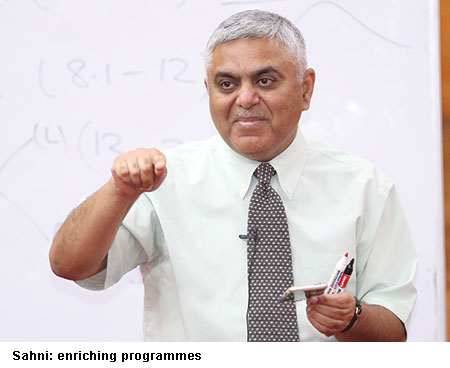 For instance JIBS (estb. 2013) researches the behavioural sciences and offers psychology, organisational behaviour, competency mapping, compensation and benefits, business etiquette and communication, juvenile delinquency and victim psychology and forensic courses to students of all JGU schools. “We believe that JIBS’ carefully researched and designed courses significantly enrich and enhance the study programmes of the eight schools of JGU which are committed to broad-based inter-disciplinary law, liberal arts and humanities education. Moreover, we also provide leadership development, competency mapping, organisational behaviour programmes to primary-secondary school leaders and principals. During the past five years we have provided leadership organisational development and related training to over 23,000 school principals across the country. These external programmes are provided free-of-charge by JIBS in the larger national interest,” says Dr. Sanjeev Sahni, an alumnus of Punjab, Illinois and Texas universities and former HRD director of Jindal Steel & Power Ltd, and currently director of JIBS.
For instance JIBS (estb. 2013) researches the behavioural sciences and offers psychology, organisational behaviour, competency mapping, compensation and benefits, business etiquette and communication, juvenile delinquency and victim psychology and forensic courses to students of all JGU schools. “We believe that JIBS’ carefully researched and designed courses significantly enrich and enhance the study programmes of the eight schools of JGU which are committed to broad-based inter-disciplinary law, liberal arts and humanities education. Moreover, we also provide leadership development, competency mapping, organisational behaviour programmes to primary-secondary school leaders and principals. During the past five years we have provided leadership organisational development and related training to over 23,000 school principals across the country. These external programmes are provided free-of-charge by JIBS in the larger national interest,” says Dr. Sanjeev Sahni, an alumnus of Punjab, Illinois and Texas universities and former HRD director of Jindal Steel & Power Ltd, and currently director of JIBS.
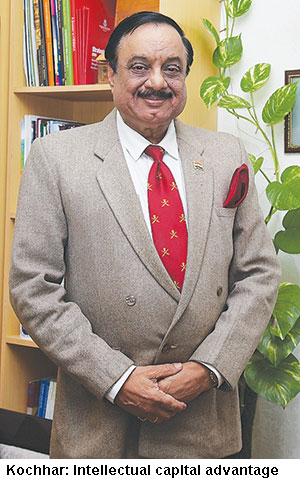 Similarly, JILDEE (estb. 2012) has provided short-term management development programmes, in-service training and executive education to over 4,500 officers of Central and state governments and public sector enterprises, says Lt. General (Retd.) Rajesh Kochhar, director of this institute which has also dispensed customised short-term soft skills development, law, finance and leadership education to government officials of Afghanistan and Bangladesh.
Similarly, JILDEE (estb. 2012) has provided short-term management development programmes, in-service training and executive education to over 4,500 officers of Central and state governments and public sector enterprises, says Lt. General (Retd.) Rajesh Kochhar, director of this institute which has also dispensed customised short-term soft skills development, law, finance and leadership education to government officials of Afghanistan and Bangladesh.
“Our executive training and development programmes are becoming increasingly popular with governments across the country and in our neighbourhood because we are able to draw upon the high quality intellectual capital of JGU.
Moreover with JGU having signed academic collaboration agreements with over 250 universities around the world, JILDEE has designed 15 fully residential executive development programmes with Cambridge and Oxford universities and the National University of Singapore for delivery in India and abroad. With the backing of all eight schools of JGU and their vast international network, this institute has a very bright future,” says Kochhar.
A defining characteristic of this young university, which differentiates it from the overwhelming majority of India’s 800 universities, is JGU’s determination to become internationally competitive and zoom upwards in the WUR (World University Rankings) league tables of QS, THE and Shanghai Jiao Tong University. This determined upward mobility is evidenced by the establishment of JGU’s ORBIT (Office for Ranking, Benchmarking & Institutional Transformation) whose six researchers are wholly engaged in studying and tracking the processes, time lines, evolving parameters etc. of the London-based QS and Times Higher Education and other university rating and ranking agencies around the world. A second unit within ORBIT collates information relating to research activity from within JGU, and is constantly engaged with the US-based Elsevier-Scopus which provides globally-respected reports relating to the world’s research output in the fields of science, technology, medicine, social sciences, liberal arts and the humanities.
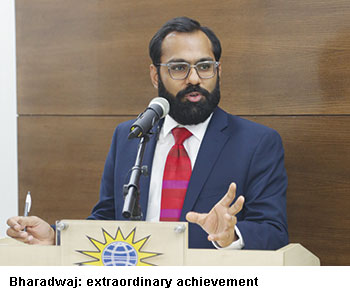 According to Dr. Ashish Bharadwaj, an economics alum of the Madras School of Economics (Chennai), Rotterdam (Netherlands), Hamburg (Germany) and Manchester (UK) universities with a Ph D from University of Munich (Germany) and executive director of ORBIT, JGU is the youngest university to be ranked among the top 3 percent in the QS BRICS and Asia 2018-19 league tables. “Between 2010 and 2018, our 432 faculty members have published 1,050 research papers in peer-reviewed journals that are respected by Elseiver in its Scopus database. This is an extraordinary achievement in eight years and perhaps unmatched in non-STEM, non-medicine disciplines. In this connection, it’s also pertinent to note the potential and impact of JGU’s 56 research centres across areas in social sciences, arts and humanities,” says Bharadwaj.
According to Dr. Ashish Bharadwaj, an economics alum of the Madras School of Economics (Chennai), Rotterdam (Netherlands), Hamburg (Germany) and Manchester (UK) universities with a Ph D from University of Munich (Germany) and executive director of ORBIT, JGU is the youngest university to be ranked among the top 3 percent in the QS BRICS and Asia 2018-19 league tables. “Between 2010 and 2018, our 432 faculty members have published 1,050 research papers in peer-reviewed journals that are respected by Elseiver in its Scopus database. This is an extraordinary achievement in eight years and perhaps unmatched in non-STEM, non-medicine disciplines. In this connection, it’s also pertinent to note the potential and impact of JGU’s 56 research centres across areas in social sciences, arts and humanities,” says Bharadwaj.
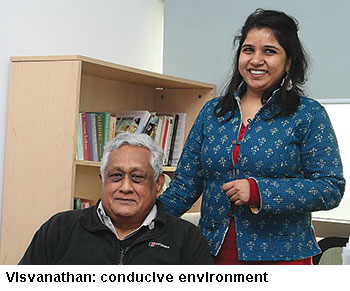 The pervasive research and new knowledge creation culture focus of students as well as faculty, rare in India’s 800 universities which tend to be teaching oriented, is underscored by Shiv Visvanathan, the well-known author (Organizing for Science (1985), A Carnival for Science (1997), Foulplay: Chronicles of Corruption (1999)), brilliant newspaper essayist and currently vice dean of JGLS and director of the Centre for the Study of Knowledge Systems at JGU. “Research is an unpredictable wager. It flourishes in an environment conducive for playful experimentation. This environment exists in JGU. It provides excellent conditions for great research,” says Visvanathan, an alum of Madras University and Delhi School of Economics and visiting professor at the Goldsmith (London) and Maastrict (Netherlands) universities.
The pervasive research and new knowledge creation culture focus of students as well as faculty, rare in India’s 800 universities which tend to be teaching oriented, is underscored by Shiv Visvanathan, the well-known author (Organizing for Science (1985), A Carnival for Science (1997), Foulplay: Chronicles of Corruption (1999)), brilliant newspaper essayist and currently vice dean of JGLS and director of the Centre for the Study of Knowledge Systems at JGU. “Research is an unpredictable wager. It flourishes in an environment conducive for playful experimentation. This environment exists in JGU. It provides excellent conditions for great research,” says Visvanathan, an alum of Madras University and Delhi School of Economics and visiting professor at the Goldsmith (London) and Maastrict (Netherlands) universities.
Inevitably, the rising popularity of JGU and several other next gen private universities such as Ashoka, Shiv Nadar, Bennett and the proposed Krea University down south within the country’s fast-expanding middle class whose children cannot meet the sky-high school-leaving exam cut-offs demanded by the few top-ranked, heavily-subsidised Indian undergrad colleges and universities, and were hitherto obliged to send their progeny to universities abroad, is bad news for subsidies-addicted socialists and lefties of all stripes and hues who dominate the academy. For this tribe, although India’s private universities provide comparable undergrad and postgrad education at 20-25 percent of the tuition fees of British and American higher education institutions, they are per se elitist institutions engaged in “commercialisation of education”.
This phrase was given enduring currency by the late Justice V.R. Krishna Iyer, a self-confessed communist appointed judge of the Supreme Court by the late prime minister Indira Gandhi in the 1970s, the heyday of neta-babu socialism which mired the Indian economy in the Hindu rate of GDP growth (3.5 percent per annum) for over four decades and wiped out the legitimate hopes and aspirations of an entire generation of post-independence India.
“These five-star new private universities such as JGU are islands of privilege built by capitalist industry leaders who are entering the education sector to cater to the new class of nouveau riche which has mushroomed after the liberalisation of the Indian economy in 1991. They provide Western-style education completely divorced from the needs of citizens at the bottom of India’s socio-economic pyramid and will further widen the income gap between rich and poor,” says an avowedly leftist professor of sociology at Delhi University, speaking to your correspondent on condition of anonymity “because crony capitalism is riding high in contemporary Delhi”.
Perhaps in anticipation of such criticism, the JGU management has taken pains to ensure student body diversity within this new genre liberal arts university. According to JGU spokespersons, not only are the tuition and full board fees in this wholly residential university 20-25 percent of the sky-high fees levied by Anglo-American higher education institutions, almost 60 percent of students admitted annually into its eight schools are awarded scholarships of varying amounts from the annual revenue of JGU which claims to be a self-sustaining institution.
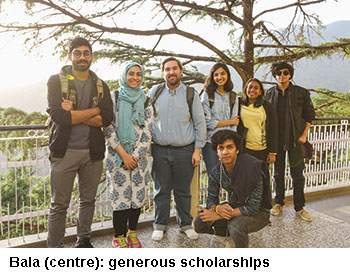 “Over 50 percent of our annual intake of 1,800 students are granted scholarships of 10-100 percent of their tuition fees on the basis of a merit-cum-means system based upon the income tax returns of their parents and school-leaving class XII exam results or in our entrance tests. We also award full scholarships to foreign students from South Asia and developing countries of Africa. In recent years, we have admitted scholarship students from Mozambique, Angola, Liberia and Tibet,” says Sean P. Bala, an empirical religions graduate of Harvard University who teaches inter-disciplinary studies and is director of admissions and outreach at JGU.
“Over 50 percent of our annual intake of 1,800 students are granted scholarships of 10-100 percent of their tuition fees on the basis of a merit-cum-means system based upon the income tax returns of their parents and school-leaving class XII exam results or in our entrance tests. We also award full scholarships to foreign students from South Asia and developing countries of Africa. In recent years, we have admitted scholarship students from Mozambique, Angola, Liberia and Tibet,” says Sean P. Bala, an empirical religions graduate of Harvard University who teaches inter-disciplinary studies and is director of admissions and outreach at JGU.
Against this backdrop of JGU’s smooth glide down the slipway, dextrous harbour piloting and entry into open waters, it’s unsurprising that vice chancellor Raj Kumar is confident of smooth sailing for this young university.
“JGU has got off to a very satisfactory start. We have been successful in attracting truly outstanding faculty by building an enabling environment and research culture in which faculty and students are eager to invest in knowledge creation and ideas. Moreover, thanks to a committed philanthropist in chancellor Naveen Jindal who understands the value of institutional autonomy, we have the resources needed to recruit the best faculty from around the world and provide them and our students an enabling infrastructure. In our formative years, we have been able to develop transparent academic and research processes based on integrity and rectitude. On this strong foundation, we are confident of developing JGU into a nationally and globally respected liberal arts university,” says Raj Kumar.
In the national interest, it’s a consummation devoutly to be wished.
“Need to strengthen philanthropy culture”
Dilip Thakore interviewed Naveen Jindal, chairman of the Delhi-based Jindal Steel & Power Ltd and founder-chancellor of O.P. Jindal Global University (JGU). Excerpts:
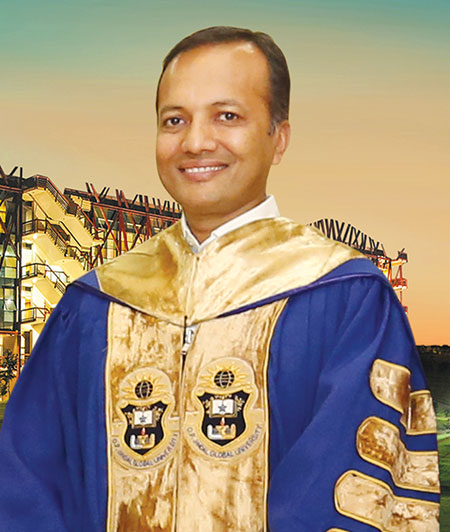 What were the factors, aims and objectives which prompted you to promote JGU in 2009?
What were the factors, aims and objectives which prompted you to promote JGU in 2009?
JGU was established in memory of my late father, Shri O.P. Jindal who had undertaken considerable work in the area of education in Haryana. Apart from his work as an elected representative and public servant, my father was driven by the need to give back to his community and society as a whole. Inspired by his life’s work, it became a tradition for my family and myself to contribute our time, effort and resources to development causes, particularly focusing on education and women’s empowerment.
The O.P. Jindal Gramin Jan Kalyan Sansthan (OPJGJKS) and JSPL Foundation have promoted and sustain several educational initiatives across the country. Among them are the O.P. Jindal Community College, O.P. Jindal Hospital and Research Centre in Raigadh, the O.P. Jindal Schools of Chhattisgarh, Jharkhand and Odisha and more recently, a greenfield O.P. Jindal University in Chhattisgarh. All of these are not-for-profit institutions and were founded in the spirit of making education accessible to communities in which the Jindal Steel & Power Ltd is operational. The O.P. Jindal Global University, Sonipat is yet another opportunity for us to expand this mission to promote high-quality education in our home state of Haryana, while drawing in talented and accomplished students, faculty, staff and researchers from all over India and around the world. It is a fitting tribute to my father’s life and legacy.
To what extent have these aims and objectives been fulfilled? How satisfied are you with the growth and development of JGU?
Over the past nine years since it was founded, JGU has made good progress towards achieving its goals and could well emerge as a model for higher education in India. From a single school with 100 students and ten full-time faculty members in 2009, it has grown into a full-fledged university with eight interdisciplinary schools, three research and capacity building institutes and over 4,300 students mentored by 400 faculty with globally-respected credentials. That’s more than satisfactory progress.
What in your opinion are the major factors behind the rapid rise of JGU in public esteem?
Our consistent focus on admitting meritorious students from across the country; recruiting and retaining highly accomplished faculty, scholars, researchers and administrators; and providing world-class physical infrastructure that enables academic rigour and research innovation.
Currently, our students are from 28 Indian states and four Union Territories; faculty from 23 Indian states and over 30 countries around the world. Over 73 percent of our faculty hold at least one international degree, with 55 percent awarded degrees from the Top 200 universities of the world. This is unprecedented for any university in Asia.
Recently The Economic Times identified JGU as India’s most international university? What’s your reaction?
We are encouraged by such recognition because it’s a reinforcement of our vision to build a global institution. In addition to recruiting accomplished faculty, scholars and researchers from around the world, we are also strengthening recruitment of international students from our neighbouring countries and beyond. Moreover since 2009, we have signed collaborations and partnerships with more than 250 leading international universities, institutions, and government and non-government organisations in over 50 countries.
Evidently the O.P. Jindal Gramin Jan Kalyan Sansthan has made a huge investment in JGU. What is the quantum?
Our commitment to philanthropy is central to our goals and aspirations of developing our business enterprises. As far as JGU is concerned, the OPJGJKS trust has committed to Rs.500 crore for the initial years, but we are not limited by this commitment. We are determined to provide whatever resources it takes to build a world class university in India, which will contribute to the development of the larger higher education eco-system in India.
The Kothari Commission (1966) recommended public expenditure on education to aggregate 6 percent of GDP per year. Yet this target has never been attained in 70 years. What’s your comment?
There is indeed a crisis of investment and funding for education in India. To meet the rising needs and expectations of our population and reap our demographic dividend, a thorough re-examination of the funding framework, is an urgent necessity. While this needs policy debate and scrutiny at the level of the Central and state governments, we also need to build a culture of philanthropy in education.
Some of the most respected higher education institutions of the world were built by philanthropists such as John Harvard, Elihu Yale, and Jane and Leland Stanford in the United States, and Li Ka Shing and Run Run Shaw in Asia. We need to strengthen this culture of philanthropy so that the next generation of Indian youth is not deprived of education and life opportunities.
“We have embraced internationalism from day one”
Dilip Thakore interviewed Dr. C. Raj Kumar, an alum of Madras, Delhi, Oxford, Harvard and Hong Kong universities and founding vice chancellor of the O.P. Jindal Global University (JGU, estb.2009), in his office on the green 80-acre campus of this new genre varsity. Excerpts from a 90-minute interview:
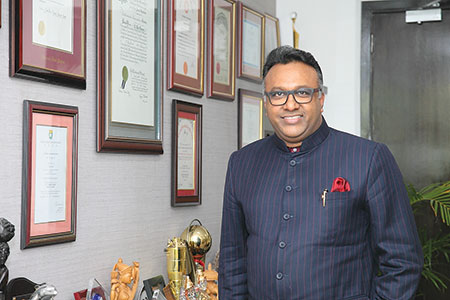 Within a decade since it admitted its first batch of students, JGU has made it into the World University Rankings of the London-based QS and is shortlisted for being designated an Institution of Eminence by the HRD ministry. How satisfied are you with the development of JGU thus far?
Within a decade since it admitted its first batch of students, JGU has made it into the World University Rankings of the London-based QS and is shortlisted for being designated an Institution of Eminence by the HRD ministry. How satisfied are you with the development of JGU thus far?
I’m deeply satisfied with the progress we have made in our long, arduous and testing first decade. A favourable combination of factors — a generous and committed philanthropist, full academic autonomy, our success in recruiting the country’s best and most international faculty, partnerships including faculty and student exchanges, study abroad and dual degree programmes and joint research with over 250 top-ranked academic institutions in 55 countries — is behind the quick rise of JGU in public esteem.
What in your opinion are the prerequisites of a good and going-on-to-be-great university?
Internally, an outstanding faculty. But to be able to recruit internationally reputed scholars and faculty, promoters need to build an enabling environment and infrastructure which facilitates teaching and research. Secondly, an aspirationally contemporary university needs to build a research culture from the very beginning. Its leadership must inculcate a conducive culture in which faculty and students are involved in creating new knowledge, innovations and are invested in new ideas. Third, it must have the resources and timely release of funds to recruit excellent faculty and admit aspirational students, build enabling infrastructure and incentivise research and knowledge creation. Moreover, its management must introduce transparent administrative, teaching and research processes based on the virtues of academic integrity and moral rectitude.
However, it’s also important that external conditions are conducive to the growth of great universities. Admittedly, government regulation is necessary. But it should be light handed and respectful of the administrative and academic autonomy of higher education institutions. In this connection, the full autonomy granted recently to the IIMs and the graded autonomy granted by UGC to well-performing universities six months ago, are steps in the right direction.
As indicated in the name and title of JGU, internationalism seems to be a major focus area of this new university. What’s your comment?
The high importance we accord in JGU to internationalism reflects our acceptance of the reality of the emergence of a new globalised world and marketplace for goods, services, new ideas and innovations. Unfortunately, the great majority of India’s universities haven’t absorbed the reality of globalisation. On the other hand, in JGU we have embraced this reality from day one and have made determined efforts to recruit internationally respected faculty and enter into academic and joint research partnerships with over 250 universities and institutions round the world.
Some educationists believe too much weightage is accorded to the research parameter in the WURs of QS and THE. They say India’s universities shouldn’t follow suit. Your comment.
I am afraid I don’t agree with this view. Research is important because it results in the creation of new knowledge suited to local ground conditions and challenges. It provides opportunities to address the problems of society and results in new discoveries in various fields of knowledge. Therefore, research can make great contributions to the development and progress of societies in which it is conducted. Moreover, it is important for research papers to be published in peer reviewed journals and cited in internationally respected publications to test their quality.
Private university tuition fees are several multiples of fees levied by government varsities. Therefore, private universities are described as elitist…
If you examine the actual per capita cost of education provision of India’s Top 50 ranked universities, you will find the tuition fees levied by JGU which include the costs of board and lodging — we are a wholly residential university — are competitive. We don’t receive any funds from government. We are entirely self-funded and that makes a huge difference. Moreover, 50-60 percent of our students are awarded scholarships of varying amounts.
How optimistic are you of the Indian education system catching up with the West within the next few decades?
I am very optimistic. There is an extraordinary positive energy in the country’s young population. The country’s youth is beginning to appreciate that education — universal school education in rural India and building capacity in higher education — is the currency of upward social mobility and national development. There is a great ferment in the country’s education system and rising awareness that education and knowledge creation is the passport to national development.
Also read: EW Interview: Prof. Dr. C. Raj Kumar, VC, O.P. Jindal Global University
JGU student voices
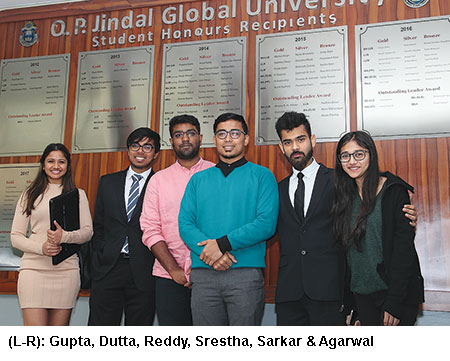 I have had a very satisfying and intellectually stimulating experience studying international affairs in JGU. The faculty is excellent and I believe I am prepared for a career in the United Nations or one of its agencies or a global policy think tank — Megha Gupta, final year student, JSIA
I have had a very satisfying and intellectually stimulating experience studying international affairs in JGU. The faculty is excellent and I believe I am prepared for a career in the United Nations or one of its agencies or a global policy think tank — Megha Gupta, final year student, JSIA
The freedom to choose subjects of study from a wide number of electives offered by the other schools of JGU is an extraordinary feature of education here. I am very pleased I have been able to select electives such as journalism, global legal order and sports law — Sagar Shrestha, JGLS
Intellectually stimulating experience. Extraordinary opportunities to acquire a fulfilling multi-disciplinary education — Shubhamay Dutta, JGLS
Excellent faculty which stimulates and teaches students how to think — Pallavi Agarwal, JSIA
A remarkable feature of education at JGU is the opportunity to interact with students and faculty from across India and around the world, and the diversity of study programmes offered. A very enriching experience — Udeep Perumal Reddy, JSIA
JGU is a very student-friendly institution. Faculty members are very accessible, and students have the choice to avail a wide range of co-curricular activities, and sports facilities are excellent — Deep Narayan Sarkar, JGLS
